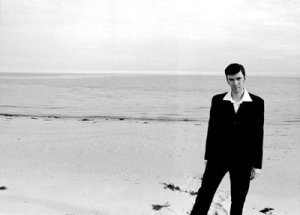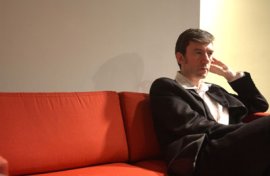Thrawn Glories and Holy Loves: Interview with James Grant
by anna battista

Step back in time. Say, go back to the early ‘80s, to 1984 to be precise. This was the year Friends Again, with a line-up including James Grant, Chris Thomson, Paul McGeechan, Neil Cunningham and Stuart Kerr, released Trapped and Unwrapped (Mercury). Unfortunately, this was their first and only album: soon after it Thomson formed The Bathers, Cunningham became Paul Haig’s manager and the remaining three members formed Love and Money. In the late eighties the band’s second album Strange Kind of Love (Mercury, 1988), produced by Gary Katz, sold pretty well, while the single “Halleluiah Man” (Mercury, 1988) became one of their most successful hits. Love and Money split up after four albums, but their death represented the birth of their front man James Grant’s solo career. He is regarded as one of Scotland's greatest songwriting talents, a statement proved true by his dark and refined debut album Sawdust in My Veins (Survival, 1998), followed by My Thrawn Glory (Vertical, 2001) and I Shot the Albatross (Vertical 2002). The latter is a sort of experiment, fusing the words of poets such as EE Cumings and W.H.Auden with music.
Fast forward to 2005. Nowadays Grant, who’s still living in Glasgow, prefers to leave behind the past, and Love and Money, and work on his future career. He has recently released a new album, Holy Love (Vertical, 2004), that simply melts your heart with its bittersweet songs. “I’m always happy with the records I put out,” Grant tells me on the phone on a cloudy Tuesday morning, “I don‘t really like making the same record twice. For ‘Holy Love’, I went for a kind of organic approach: I wanted to make a visceral record, something that came from the gut, and I also wanted the album to feel live, to have the feeling that the music I was listening to every time I put the album on was happening right in front of me.” Mixed and mastered by Paul McGeechan, Holy Love features ten songs. On all of them careful listeners will recognise two singers with very distinct and beautiful voices: Monica Queen (ex-Thrum) and Capercaillie’s Karen Matheson.
Grant worked with both of them previously: Queen featured also on I Shot the Albatross, while his collaboration with Matheson started in 1996 when he worked on her debut solo album The Dreaming Sea, and since then continued on a regular basis. Indeed Grant also worked on her follow up “Time To Fall”.“I met Monica when we were asked to perform on a music programme in Scotland,” Grant remembers, “we had a chat and a few beers afterwards and it just became clear there was an affinity between us. I asked Monica to sing on a specific track, ‘A Tale Best Forgotten’, on I Shot the Albatross and she did a fantastic job. We worked quite closely together ever since. I’ve also been working a lot with Karen Matheson and Donald Shaw from Capercaillie. I don’t feel I’ve had to change the way I write to incorporate myself into Karen’s music, it has been more a happy medium for us both. Karen’s voice has got a beautiful purity to it and I tend to find easier to write for women rather than men.”
Of all the albums Grant did, he claims he can’t judge which one can be considered as his most complete. “I like them each in their own way,” he explains, “I think they’re all different, once I’ve made a record I don’t tend to sit and assess it, the next day I’m already onto the next one.” Yet amongst his solo albums, I Shot the Albatross strikes the listener for being an original and interesting approach to music and poetry. “I’d like to think it is,” Grant states, “it’s just something that interested me and I decided to pursue it. At the time, I was doing music for a film with Donald and I ended up editing and narrating a selection of 20th century Scottish poetry. A few years before I had bought a book and some of the poems on it seemed to me very lyrical and I kind of liked the idea of fusing for example Rimbaud, Lee Dorsey and William Blake, it seemed to me kind of cheeky and irreverent, yet I thought it would put a new spin on the poetry itself and, I suppose, would also challenge people.”
Grant might like challenging people with his music, but he also likes being challenged with projects such as soundtracks. In 1995 he wrote with Paul McGeechan the soundtrack for the Scottish thriller The Near Room, directed by David Hayman. It was such a good experience that Grant would do it again, “It was interesting, in many ways it’s easier than writing your own material because you’ve a ready made concept and you have to work around that, though it usually depends on who you’re working with,” Grant recounts. “I’ve been fortunate and most of the people I’ve worked with in film have let me express myself, but I realised that in certain instances this isn’t possible or it doesn’t really happen and I’m not so sure I’d like a project like that. I liked the people I worked with: people who want to work with me know what I’m like, if they want something else, they shouldn’t ask me. That’s the way I also view record companies, they shouldn’t sign an act if they want to change them, they should sign somebody for something they like.”
 Nowadays Grant doesn’t listen to music very much, he prefers reading or silence. “I’m making music all the time and I’m listening to it when I work,” he states, “so I really love silence, I love being able to read and write in silence.” His inspirations, though, still come from music rather than books. “I tried to write a book, but that’s even harder than writing songs,” he reveals, “it’s very difficult to write prose, I think it would take a phenomenal amount of time to write a book. I once worked on a story for a long time: I researched and started writing it, but then gave it up after six months, though I may come back to it, or I might simply end up having another idea and work on that. I put snatches of what I was writing in poetry form on my website, it’s basically about a priest who finds a gun and becomes obsessed by it. At present, I’m happy to do what I’m doing, if people like it, that’s great, but if they don’t, they can fuck off, it doesn’t really bother me. It’s great to have no expectations, people don’t know what I’m going to do next, I myself don’t know what I’m going to do next and I think that’s a good position to be in. I just live day-to-day and work away, trying to express myself, it’s better than a real job, though it can be mind numbing in its own way and you sometimes might end up staring at a blank page for three hours, but when it works it’s really great and it makes it worthwhile.”
Nowadays Grant doesn’t listen to music very much, he prefers reading or silence. “I’m making music all the time and I’m listening to it when I work,” he states, “so I really love silence, I love being able to read and write in silence.” His inspirations, though, still come from music rather than books. “I tried to write a book, but that’s even harder than writing songs,” he reveals, “it’s very difficult to write prose, I think it would take a phenomenal amount of time to write a book. I once worked on a story for a long time: I researched and started writing it, but then gave it up after six months, though I may come back to it, or I might simply end up having another idea and work on that. I put snatches of what I was writing in poetry form on my website, it’s basically about a priest who finds a gun and becomes obsessed by it. At present, I’m happy to do what I’m doing, if people like it, that’s great, but if they don’t, they can fuck off, it doesn’t really bother me. It’s great to have no expectations, people don’t know what I’m going to do next, I myself don’t know what I’m going to do next and I think that’s a good position to be in. I just live day-to-day and work away, trying to express myself, it’s better than a real job, though it can be mind numbing in its own way and you sometimes might end up staring at a blank page for three hours, but when it works it’s really great and it makes it worthwhile.”
There are no plans for a James Grant tour, even though he recently played in Edinburgh and at Glasgow’s Royal Concert Hall. “I can’t really afford touring,“ he explains, “the record company won’t subsidise it, but I’ll go wherever I’m wanted: if people want me to come and play, I’ll do it, even my fans, if they want me to come and play, I’ll do it. Fans have actually started organising gigs for me which is great.”
There is something James Grant fans can look forward to, a new album, he’s indeed already working on new ideas, “I guess it’s a very cyclical thing, you finish one album, you move onto another,” he states, “especially in these days because you don’t even tend to promote it, so a record comes out and then dies a couple of weeks later and then you have to move to the next one. I’m not sentimental, I’d like more people to hear my music, but if that can’t be done through regular channels, hopefully I can do it in other ways, like I said I’ll go wherever I’m wanted, but without radio play and press and all the rest that goes with it, it’s very difficult for people to know that you even exist.”
Since we’re chatting about recording new material, I ask him if there is an artist or a producer he would like to collaborate with. “Paul McCartney,” he answers, after a brief pause, “I could probably help him out, I think his music is too happy, I could be his foil, like John Lennon. I could drag his songs into the gutter,“ he laughs, “for what regards producers, I really like the guy who produced The Flaming Lips and The Delgados, Dave Fridmann, he’s really great. I quite like the guy from Talk Talk as well, because he always made good records, maybe such collaborations would be interesting,” he pauses, then laughs again, “but these things are never likely to happen, though you never know…”
Grant has understandably distanced himself from the ‘80s, finding new inspirations and a beautiful sound and revealing his special flair for writing touching lyrics. “In the Land of the Bland/I’m a passerby, an invisible man/Why should I go against my nature?”, Grant sings on “The Soft Option”, the last track on his most recent album. But, contrary to the man in the song, he’s not really “going along with it”, conforming to a world where blandness is often the key to success. This is why Grant is one of the most understated, but also one of the most talented and highly-accomplished artists around. Bless him.
All photographs © Craig McKay, taken from the James Grant web site.
This interview first appeared on the site www.rainsound.net
James Grant: http://www.tapecircle.co.uk/jamesgrant/
Vertical Records: www.verticalrecords.co.uk
Copyright (c) 2005 erasing clouds |
|